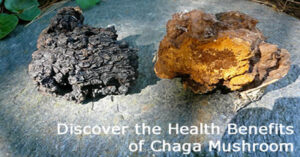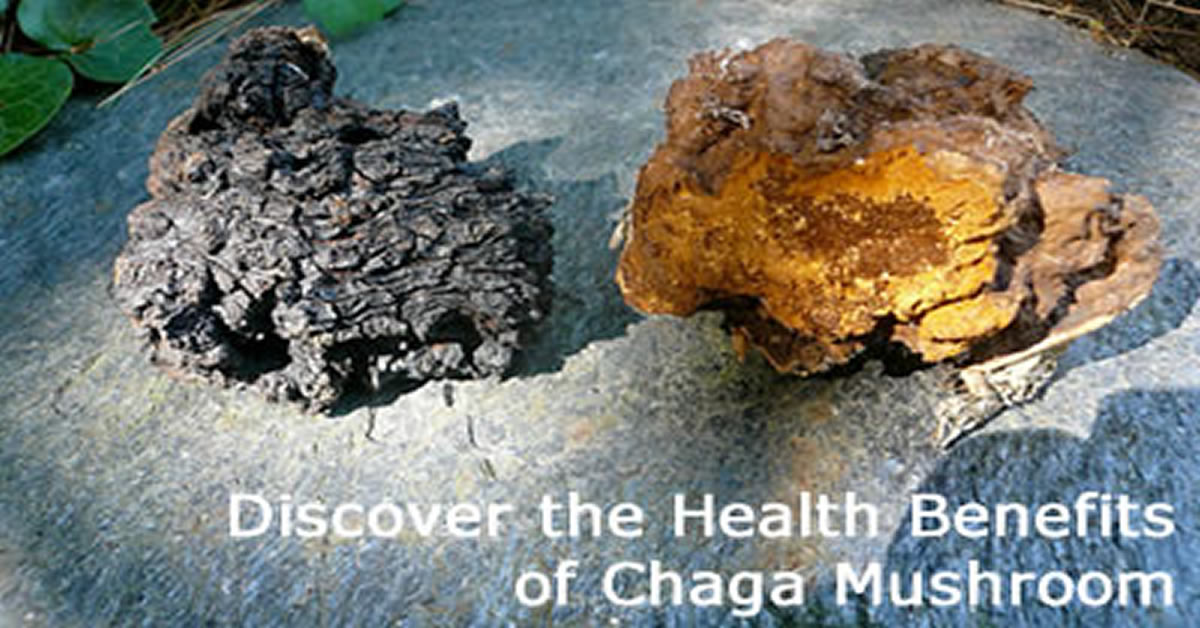Chaga Mushroom
Chaga Mushroom: History, Benefits, Effectiveness, and Safety
Chaga mushroom, scientifically known as Inonotus obliquus, is a type of fungus that grows primarily on birch trees in cold climates, including parts of Europe, Asia, and North America. It has gained popularity in recent years for its potential health benefits, particularly in terms of its immune-boosting properties. In this comprehensive article, we will delve into the history, benefits, effectiveness, and safety of Chaga mushroom, as well as how to prepare and consume it.
 History of Chaga Mushroom: The use of Chaga mushroom dates back centuries and has a rich history in traditional medicine practices, especially in Siberia and other parts of Russia. It has been employed as a folk remedy for various ailments, such as digestive issues, skin conditions, and even cancer. Chaga has also played a role in traditional Chinese medicine.
History of Chaga Mushroom: The use of Chaga mushroom dates back centuries and has a rich history in traditional medicine practices, especially in Siberia and other parts of Russia. It has been employed as a folk remedy for various ailments, such as digestive issues, skin conditions, and even cancer. Chaga has also played a role in traditional Chinese medicine.
The historical use of Chaga can be attributed to its impressive nutrient profile, which includes vitamins, minerals, and bioactive compounds. In particular, Chaga is rich in antioxidants, such as polyphenols and melanin, which are believed to contribute to its health-promoting properties.
Benefits of Chaga Mushroom
Chaga mushroom has garnered attention for its potential health benefits. While it’s important to note that more research is needed to establish some of these claims definitively, here are some of the key benefits associated with Chaga:
- Immune Boosting Properties: Chaga is often touted for its immune-boosting properties. This is largely attributed to its beta-glucans, a type of polysaccharide that may help stimulate the immune system and enhance its ability to combat infections and diseases[i]–[ii].
- Antioxidant Power: Chaga is rich in antioxidants, which can help neutralize harmful free radicals in the body. This may contribute to its potential to protect cells from oxidative damage and reduce the risk of chronic diseases[iii].
- Anti-Inflammatory Effects: Some studies suggest that Chaga may have anti-inflammatory properties. Inflammation is a key driver of many chronic diseases, and by reducing it, Chaga may have a positive impact on overall health[iv].
- Support for Digestive Health: Traditionally, Chaga has been used to alleviate digestive discomfort. It may help soothe and support the gastrointestinal system, promoting better digestive health[v].
- Potential Cancer-Fighting Properties: While research is ongoing, some studies have shown that Chaga extracts may inhibit the growth of cancer cells. However, it’s crucial to emphasize that Chaga should not be considered a sole treatment for cancer, and medical guidance is essential for those with cancer[vi].
Safety of Chaga Mushroom
Chaga mushroom is generally considered safe when consumed in moderation as a food or beverage. However, there are some important considerations to keep in mind:
- Allergic Reactions: Some individuals may be allergic to Chaga mushrooms. If you’re trying Chaga for the first time, start with a small amount and monitor for any adverse reactions.
- Interactions with Medications: Chaga may interact with certain medications, particularly those that affect blood clotting or the immune system. If you’re taking any medications, consult with a healthcare professional before adding Chaga to your diet.
- Purity and Quality: It’s essential to source Chaga products from reputable suppliers to ensure they are free from contaminants and grown in clean environments.
- Dosage: There is no established recommended dosage for Chaga, and its effectiveness can vary depending on factors such as preparation and individual tolerance. It’s best to start with small amounts and gradually increase if needed.
- Pregnancy and Breastfeeding: Pregnant and breastfeeding individuals should exercise caution and consult with a healthcare provider before using Chaga supplements.
How to Prepare and Consume Chaga Mushroom
Chaga can be consumed in various forms, including tea, tinctures, capsules, and extracts. Here’s how to prepare Chaga tea, one of the most popular methods:
Chaga Tea Recipe:
Ingredients:
- Chaga mushroom chunks or powder
- Water
- Optional sweeteners or flavorings (e.g., honey, cinnamon, ginger)
Instructions:
- Start with dried Chaga mushroom chunks or powder. If using chunks, break them into smaller pieces.
- Boil water and then reduce the heat to a simmer.
- Add the Chaga chunks or powder to the simmering water.
- Allow it to steep for at least 20-30 minutes, or longer for a stronger brew.
- Strain the tea to remove any solid particles.
- Optionally, add sweeteners or flavorings to taste.
Chaga tea can be enjoyed hot or cold. It has a slightly earthy and woody flavor.
In conclusion, Chaga mushroom has a fascinating history rooted in traditional medicine and a range of potential health benefits, including immune system support, antioxidant properties, and more. While there is promising research, it’s essential to approach Chaga as a dietary supplement with care and consult with a healthcare professional, especially if you have underlying health conditions or are taking medications. As with any natural remedy, moderation is key, and it should not be used as a substitute for conventional medical treatments.
[i] Kim YR. Immunomodulatory Activity of the Water Extract from Medicinal Mushroom Inonotus obliquus. Mycobiology. 2005 Sep;33(3):158-62. doi: 10.4489/MYCO.2005.33.3.158. Epub 2005 Sep 30. PMID: 24049493; PMCID: PMC3774877. https://www.ncbi.nlm.nih.gov/pmc/articles/PMC3774877/
[ii] Kim YR. Immunomodulatory Activity of the Water Extract from Medicinal Mushroom Inonotus obliquus. Mycobiology. 2005 Sep;33(3):158-62. doi: 10.4489/MYCO.2005.33.3.158. Epub 2005 Sep 30. PMID: 24049493; PMCID: PMC3774877. https://www.ncbi.nlm.nih.gov/pmc/articles/PMC3774877/
[iii] Lu Y, Jia Y, Xue Z, Li N, Liu J, Chen H. Recent Developments in Inonotus obliquus (Chaga mushroom) Polysaccharides: Isolation, Structural Characteristics, Biological Activities and Application. Polymers (Basel). 2021 Apr 29;13(9):1441. doi: 10.3390/polym13091441. PMID: 33947037; PMCID: PMC8124789.
[iv] Arata S, Watanabe J, Maeda M, Yamamoto M, Matsuhashi H, Mochizuki M, Kagami N, Honda K, Inagaki M. Continuous intake of the Chaga mushroom (Inonotus obliquus) aqueous extract suppresses cancer progression and maintains body temperature in mice. Heliyon. 2016 May 12;2(5):e00111. doi: 10.1016/j.heliyon.2016.e00111. PMID: 27441282; PMCID: PMC4946216. https://www.ncbi.nlm.nih.gov/pmc/articles/PMC4946216/
[v] Jayachandran M, Xiao J, Xu B. A Critical Review on Health Promoting Benefits of Edible Mushrooms through Gut Microbiota. Int J Mol Sci. 2017 Sep 8;18(9):1934. doi: 10.3390/ijms18091934. PMID: 28885559; PMCID: PMC5618583. https://www.ncbi.nlm.nih.gov/pmc/articles/PMC5618583/
[vi] Lee MG, Kwon YS, Nam KS, Kim SY, Hwang IH, Kim S, Jang H. Chaga mushroom extract induces autophagy via the AMPK-mTOR signaling pathway in breast cancer cells. J Ethnopharmacol. 2021 Jun 28;274:114081. doi: 10.1016/j.jep.2021.114081. Epub 2021 Mar 30. PMID: 33798660. https://pubmed.ncbi.nlm.nih.gov/33798660/

